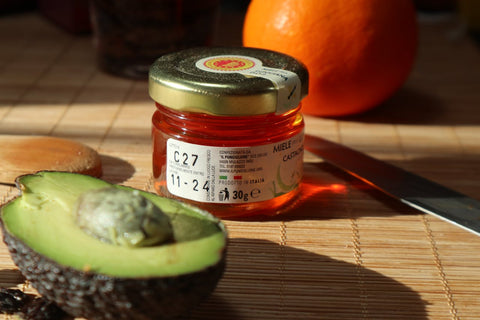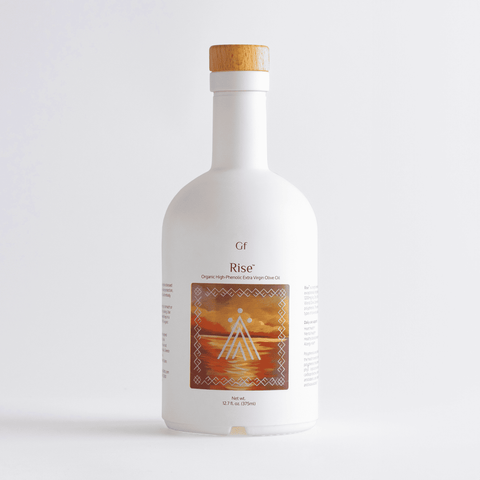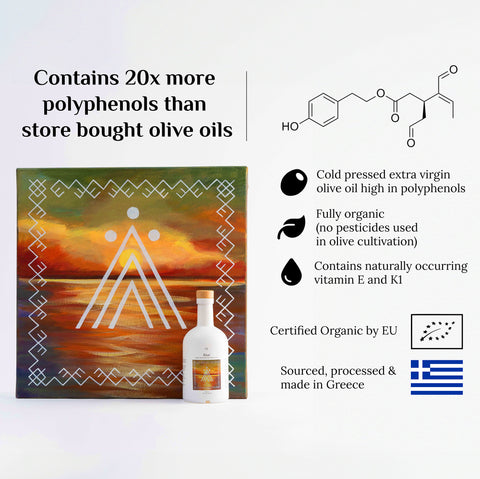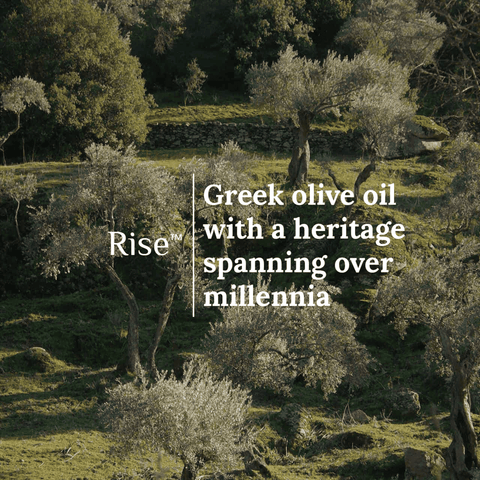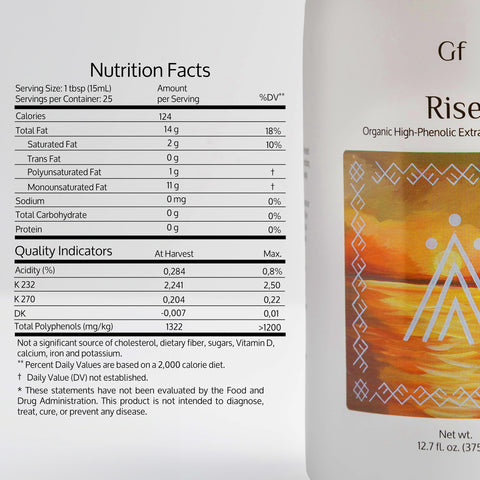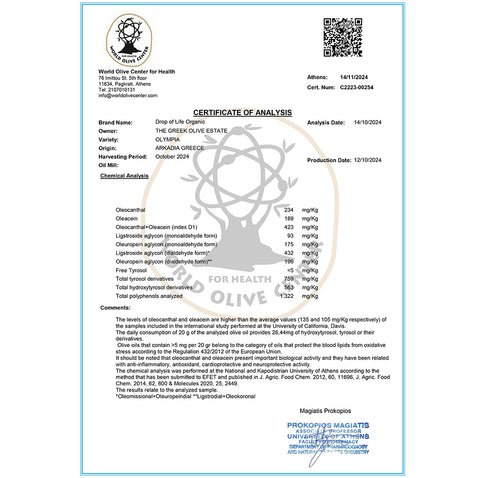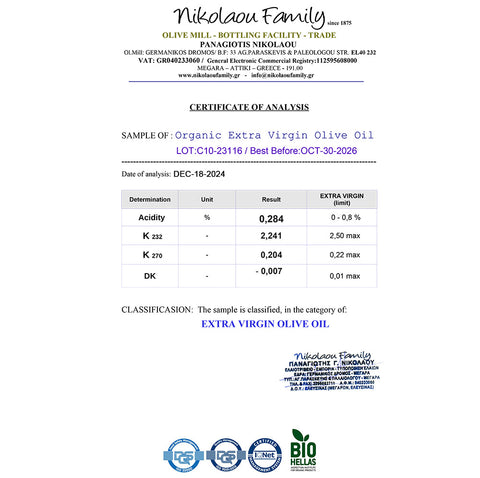Olive oil is not just a cooking staple; it is a powerhouse of health benefits. Among its various types, high-phenolic olive oils stand out for their exceptional health properties. Rich in polyphenols, these olive oils offer potent antioxidant, anti-inflammatory, and anti-aging benefits. But how can consumers identify these high-phenolic olive oils? In this comprehensive guide, we will explore the characteristics, benefits, and methods to identify high-phenolic olive oils. We'll also introduce you to our premium product, Rise™ which exemplifies the best in high-phenolic olive oils.
Understanding Polyphenols
Polyphenols are naturally occurring compounds found in plants, including olive trees. They are known for their antioxidant properties, which help combat oxidative stress and reduce inflammation in the body. Olive oil polyphenols, such as hydroxytyrosol, oleuropein, and tyrosol, contribute significantly to the oil’s health benefits. These compounds have been linked to reduced risks of chronic diseases, improved skin health, and enhanced immune function.
The Importance of High-Phenolic Olive Oils
High-phenolic olive oils contain higher concentrations of these beneficial compounds compared to regular olive oils. Scientific studies have shown that high-phenolic olive oils can:
- Reduce Inflammation: A study published in the Journal of Nutritional Biochemistry found that oleuropein and hydroxytyrosol in olive oil have potent anti-inflammatory effects, which can help reduce the risk of chronic diseases such as heart disease and arthritis.
- Boost Heart Health: Research in the European Journal of Clinical Nutrition indicates that high-phenolic olive oils can improve cholesterol levels and reduce blood pressure, contributing to better cardiovascular health.
- Enhance Cognitive Function: According to a study in Nutrients, polyphenols in olive oil can improve brain health by protecting against oxidative damage and enhancing cognitive function.
Identifying High-Phenolic Olive Oils
Recognizing high-phenolic olive oils involves understanding certain key indicators:
Label Information

Taste and Sensory Evaluation
A peppery sensation in the throat is a good sign of a high-phenolic olive oil.
Harvesting and Production Methods
Cold-pressing, a method that avoids high temperatures during extraction, helps preserve polyphenols.
Color and Appearance
High-phenolic olive oils often have a deep green color due to the high chlorophyll content, which is associated with polyphenols.
Laboratory Analysis
Some brands provide lab analysis reports or certification from recognized bodies indicating the polyphenol content. This is the most reliable method to confirm the levels of polyphenols.
The Role of Phenolic Content in Health Benefits
Polyphenols in olive oil provide numerous health benefits. Here's a closer look at some of these benefits and the scientific evidence supporting them:
1. Antioxidant Protection
Polyphenols are powerful antioxidants that protect cells from oxidative damage caused by free radicals. This protection is crucial for preventing chronic diseases and promoting overall health.
Scientific Evidence: A study in the Journal of Agricultural and Food Chemistry found that the polyphenols in olive oil significantly reduce oxidative stress in the body, which can lower the risk of chronic diseases such as cancer and cardiovascular disease. [1]
2. Anti-Inflammatory Effects
Chronic inflammation is a major contributor to many health problems, including heart disease, diabetes, and arthritis. Polyphenols in olive oil have strong anti-inflammatory properties that help reduce inflammation and promote better health.
Scientific Evidence: Research published in PLOS ONE and Current Pharmaceutical Design demonstrated that polyphenols like oleuropein and hydroxytyrosol reduce inflammation at the cellular level, which can help manage and prevent inflammatory diseases. [2, 5]
3. Heart Health
High-phenolic olive oils can improve heart health by reducing bad cholesterol (LDL) levels, increasing good cholesterol (HDL) levels, and lowering blood pressure.
Scientific Evidence: A study in the European Journal of Clinical Nutrition showed that consumption of high-phenolic olive oil leads to significant improvements in cholesterol levels and blood pressure, reducing the risk of heart disease. [3]
4. Cognitive Function
Polyphenols in olive oil also benefit brain health by protecting neurons from oxidative damage and enhancing cognitive function.
Scientific Evidence: According to research in International Journal of Molecular Sciences, polyphenols help prevent cognitive decline and improve memory and learning abilities, making high-phenolic olive oil beneficial for brain health. [4]
Rise™: Your Source for High-Phenolic Olive Oil
Here at Goodfatts, we are committed to providing you with the highest quality olive oils. Our premium product, Rise™, is a testament to this commitment. Rise™ is a high-phenolic olive oil, meticulously crafted to retain maximum polyphenols, ensuring you receive the best health benefits.
Why Choose Rise™?
- High Polyphenol Content: Rise™ boasts an exceptionally high polyphenol content, ensuring you get the maximum antioxidant and anti-inflammatory benefits.
- Cold-Pressed and Early Harvest: Our olive oil is cold-pressed from early harvest olives, preserving the rich polyphenol content and delivering a robust, flavorful oil.
- Certified Quality: Rise™ comes with laboratory certification indicating its high polyphenol levels, giving you confidence in its quality and health benefits.
Experience the Benefits of Rise™
Incorporate Rise™ into your daily routine and enjoy the numerous health benefits of high-phenolic olive oil. Whether you use it in cooking, as a salad dressing, or as a health supplement, Rise™ is your perfect companion for a healthier lifestyle. Learn more and purchase your bottle of Rise™. Elevate your health with the power of polyphenols.
References
[1] Boskou, D., & Skarkalis, P. (2011). "Antioxidant Properties of Olive Oil Polyphenols and Their Potential Use in Cosmetics." Journal of Agricultural and Food Chemistry.
[2] Omar, S. H. (2010). "Oleuropein in Olive and Its Pharmacological Effects." PLOS ONE.
[3] Fito, M., Cladellas, M., de la Torre, R., Marti, J., Munoz, D., Schroder, H., Alcantara, M., Pujadas-Bastardes, M., Marrugat, J., & Lopez-Sabater, M. C. (2005). "Anti-inflammatory effect of virgin olive oil in stable coronary disease: a randomized, crossover, controlled trial." European Journal of Clinical Nutrition.
[4] Angeloni, C., Malaguti, M., Barbalace, M. C., & Hrelia, S. (2017). "Bioactivity of Olive Oil Phenols in Neuroprotection." International Journal of Molecular Sciences.
[5] Lucas, L., Russell, A., & Keast, R. (2011). "Molecular mechanisms of inflammation. Anti-inflammatory benefits of virgin olive oil and the phenolic compound oleocanthal." Current Pharmaceutical Design.


